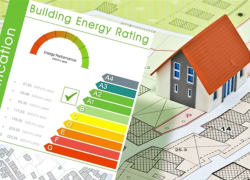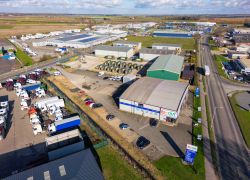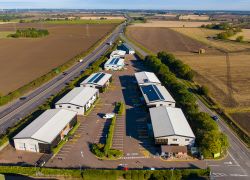Buying Commercial Property

Buying commercial property is a significant step for any business, offering both a place to operate and an investment opportunity. The UK commercial property market presents diverse options, from bustling retail spaces and modern offices to expansive industrial units. This guide provides a comprehensive overview of the process, key considerations, and the benefits and challenges involved in purchasing commercial property.
Harlaxton Estates specialises in commercial property sales, rentals, and management in Nottinghamshire and Lincolnshire. With an extensive portfolio and deep local expertise, Harlaxton Estates is well-positioned to help businesses find the perfect property to meet their needs and support their growth.
Overview of Commercial Property
Commercial property includes various types of real estate used for business purposes, such as retail spaces, office buildings, industrial warehouses, and mixed-use developments. Unlike residential properties, commercial properties are primarily intended to generate income through business activities or rental income.
For businesses, owning commercial property can provide stability, control over the premises, and potential financial benefits like capital appreciation and tax advantages. Investors are often drawn to commercial real estate due to longer lease terms and the potential for higher rental yields compared to residential properties.
Types of Commercial Property
Retail Spaces
These properties are designed for businesses that sell goods directly to consumers. They typically require high footfall, adequate parking, and excellent transport links. Examples include shops, shopping centres, and restaurants.
Office Buildings
Office spaces can range from small, single-floor offices to large, multi-story buildings. They are essential for businesses that need a professional environment to operate from. Modern office spaces now extend beyond city centres to suburban areas, provided they have good transport connectivity.
Industrial Warehouses
These properties are used for manufacturing, storage, and distribution. They often need to be located away from residential areas but close to major transport routes like motorways and rail links to facilitate logistics.
The Process of Buying Commercial Property
Initial Considerations
Before purchasing a commercial property, it's crucial to consider several key factors. First, ensure that your business plan aligns with the property's planning use. Different properties have specific planning classes dictating the types of businesses that can operate within them. Changing the use of a property might require planning permission from the local council, which can be a lengthy and potentially costly process.
Additionally, ask key questions regarding the property's location, type, and intended investment duration. The location should suit your business needs—high footfall for retail spaces, accessibility for office spaces, or proximity to major transport routes for industrial premises. Ensuring these alignments can significantly impact your business's success and operational efficiency.
Financing Options
Securing the right financing is a critical part of purchasing commercial property. Several financing methods are available, each suited to different scenarios:
Commercial Mortgages: These are the most common financing options and work similarly to residential mortgages, requiring a deposit and monthly repayments. There are two main types: owner-occupier mortgages for properties used directly by the business, and commercial investment mortgages for properties intended to be rented out.
Bridging Loans: These short-term loans are useful for quickly purchasing property before long-term financing is secured. They are often used for properties bought at auction or those requiring renovation before they can be mortgaged.
Auction Finance: A specialised form of bridging loan, auction finance helps buyers complete property purchases swiftly, typically within the 28 days required by auction houses.
Steps to Purchase
The process of buying a commercial property involves several steps:
Agree on the Purchase Price: This is usually negotiated through an estate agent. Once agreed, a memorandum of sale is prepared, outlining the transaction’s main points.
Solicitor Involvement: Both buyer and seller appoint solicitors to handle the legal aspects. The buyer’s solicitor will conduct due diligence checks, review contract terms, and manage the legal transfer of ownership.
Due Diligence: This includes property searches, checking title documents, and ensuring compliance with regulations.
Contract Agreement: Once both parties agree on the terms, contracts are signed and exchanged, with the buyer typically paying a deposit at this stage.
Completion: The final step involves the transfer of funds from the buyer to the seller, after which the legal title of the property is transferred to the buyer.
Legal and Regulatory Considerations
Planning Permissions and Building Regulations
When buying commercial property, understanding planning permissions and building regulations is crucial. Planning permissions are necessary if you intend to change the property's use, such as converting an office space into a retail store. Failing to obtain the required permissions can result in fines and legal complications.
Building regulations ensure that properties meet specific standards of construction, safety, and energy efficiency. Compliance with these regulations is mandatory and covers aspects like fire safety, structural integrity, and accessibility. Non-compliance can lead to significant penalties and delays, impacting your business operations.
Leasehold vs. Freehold
Understanding the difference between leasehold and freehold properties is essential when buying commercial property:
Leasehold: With a leasehold property, you own the building but not the land it’s on. Leaseholds typically involve paying ground rent and may include restrictions on how the property can be used or modified. Leaseholds can offer lower initial costs but may come with more ongoing expenses and less control.
Freehold: Owning a freehold property means you own both the building and the land. This option provides greater control and fewer restrictions but usually requires a larger initial investment.
Health and Safety Regulations
Owners of commercial properties have a legal obligation to ensure the premises meet health and safety standards. This includes conducting risk assessments and maintaining fire safety, gas safety, and electrical equipment safety. Additionally, properties must provide adequate ventilation, lighting, and sanitary facilities.
Regular inspections and maintenance are necessary to comply with health and safety laws. Failure to do so can result in hefty fines and potential legal action. Adhering to these standards not only ensures legal compliance but also creates a safe and conducive environment for business operations.
Financial Considerations
Costs Involved
Buying commercial property involves several costs that must be considered beyond the purchase price. These include:
Deposit: Typically, a deposit of 20-40% of the property’s value is required. Commercial properties often require higher deposits compared to residential properties due to the perceived higher risk by lenders.
Legal Fees: Solicitor fees cover the legal work involved in purchasing the property, including due diligence, contract review, and handling the transfer of ownership. These costs can vary but are a significant part of the overall expenditure (Commercial Trust).
Taxes: Stamp Duty Land Tax (SDLT) is payable on the purchase of commercial properties in the UK. The rate varies depending on the purchase price and the type of property. Additionally, VAT may be applicable on the purchase of commercial properties (Commercial Trust).
Other Costs: Additional expenses may include survey fees, insurance, and maintenance costs. These can add up and should be factored into the overall budget (Market Financial Solutions).
Tax Implications
Investing in commercial property can offer several tax benefits:
Mortgage Interest: Interest paid on commercial mortgages is generally tax-deductible, which can reduce the overall tax liability for businesses.
Capital Allowances: Businesses can claim capital allowances on certain expenditures, such as equipment and fixtures, further reducing taxable profits.
Capital Gains Tax: If the property increases in value and is sold for a profit, capital gains tax (CGT) will be applicable. The rate of CGT depends on the taxpayer's income level and the type of asset sold.
Understanding these tax implications and planning accordingly can help maximise the financial benefits of investing in commercial property.
Harlaxton Estates' Services
Harlaxton Estates offers a wide range of commercial property solutions tailored to meet the needs of businesses in Nottinghamshire and Lincolnshire. Their services include property sales and rentals, providing both purchase and lease options to fit various business requirements. For businesses looking to improve liquidity without disrupting operations, Harlaxton Estates offers sales and leaseback services, allowing companies to sell their properties and lease them back. Additionally, they provide serviced offices equipped with essential amenities and managed workspaces that can be customised to meet specific business needs.
Harlaxton Estates distinguishes itself with its extensive local expertise, diverse portfolio, and customer-centric approach. Their team provides expert guidance throughout the property acquisition process, from identifying suitable properties to negotiating terms and securing financing. Committed to personalised service, Harlaxton Estates works closely with clients to understand their specific needs and deliver tailored solutions. Numerous businesses have successfully found their ideal commercial properties through Harlaxton Estates, as highlighted by their testimonials and case studies, which underscore their ability to deliver effective property solutions and ensure customer satisfaction.
Conclusion
Buying commercial property in the UK is a multifaceted process requiring careful planning, informed decision-making, and a clear understanding of legal and financial implications. From identifying the right type of property and securing appropriate financing to navigating regulatory requirements and managing ongoing costs, each step is crucial for a successful investment. Harlaxton Estates, with its extensive local expertise and comprehensive range of services, is ready to assist businesses in finding and securing the ideal commercial property to support their growth and operational needs.




